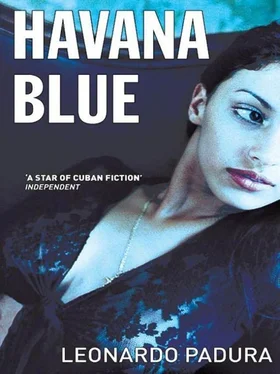She concluded, froze her synthetic smile and preserved it stoically for the video of another song, by another singer no one was interested in, which now filled the small screen.
“Come on, let’s go,” Skinny suggested, and his friend pushed his wheelchair toward the dining room. “Do you think the Industriales stand a chance?”
“Without Marquetti and Medina and with Javier Méndez injured? No, wild man, I think they’ve had it,” opined the Count, and his friend shook his head disconsolately. He suffered before and after each game, even when the Industriales won, for he thought that if they won that one, they were more likely to lose the next, and he suffered eternally, in spite of all his promises to be less fanatical and to ditch baseball: it wasn’t what it used to be, he would say, when Capiró, Chávez, Changa Mederos and Co played. But both knew they were incurable and the one most infected was Skinny Carlos.
They went over to the table and the Count analysed Josefina’s offering: the traditional black beans; pork steaks in breadcrumbs, well done but juicy all the same, as the golden rule for fillets required; the grains of rice separating out in the dish, as pure white and tender as a virgin bride; a green salad, artfully displayed with a careful combination of red and green, the golden glow of ripe tomatoes and bunches of fried, curved green plantain. And on the table another bottle of Rumanian wine, red, dry and almost perfect plonk.
“Jose, for heaven’s sake, what have we got here?” asked the Count as he bit into a fried plantain and spoiled the beautiful salad by plundering a slice of tomato. “A plague on anyone who mentions work,” he warned and began to pile a mountain of food on his plate, determined to down at one sitting breakfast, lunch and dinner on a day that looked to be never-ending – or whatever – and then he gorged himself.
Mario Conde was born in a bustling dusty barrio that, according to family lore, was founded by his paternal great-great grandfather, a madcap islander who preferred to set up home, create a family and await death on barren land far from the sea and rivers and far from the arm of the law which was still pursuing him in Madrid, Las Palmas and Seville. The barrio where the Condes lived had never been elegant or prosperous, yet it expanded exponentially with the offspring of that crooked, absolutely plebeian Canary Islander who was so infatuated with his new name and his Cuban wife that he fathered eighteen children and forced them all to swear, each at the appropriate moment, to beget at least ten children and compelled the females to give their whelps the first surname of Conde as their badge of distinction in the barrio. When Mario celebrated his third birthday and his Granddaddy Rufino the Count first told him of Granddad Teodoro’s adventures and his desire to found a dynasty, the kid also discovered that a pit for fighting cocks could also be the centre of the universe. At the time baseball was a vice he’d picked up in the barrio, while fighting cocks were an endemic pleasure. His Granddaddy Rufino, an enthusiastic breeder, trainer and gambler when it came to fighting cocks, took him to all the local pits and yards and taught him the art of preparing a cock to win every time: by first showering it with the finest, most sporting attentions a boxer could ever receive, and then anointing it with oil the moment before it stepped in to the arena so it would never be caught by its opponent. Granddaddy Rufino’s philosophy of never playing unless you were sure you would win gave the lad the satisfaction of seeing the cock he’d first met as a very ordinary egg die an old bird, winner of thirty-two contests and coverer of an innumerable quantity of hens as lively, if not livelier than himself. In those easygoing times of school in the mornings and work with cocks in the afternoons, Mario Conde also learned the meaning of the word “love”: he loved his granddaddy and was so miserable he was ill when old Rufino died, three years after the official outlawing of cockfights.
Now he’d satisfied the need for cold water that had almost dragged him from his bed, the Count began that Sunday morning by indulging in memories of his grandfather. Sunday was the day for fights in the most popular pits, and that was why he liked Sunday mornings. Not the dreary endless afternoons after a siesta when he would feel tired and sleepy till nightfall, nights weren’t any better, everywhere was packed out and he’d always take refuge at Skinny’s. However, there were other things that made Sunday nights tedious and drawn-out: there was no baseball game, and it was torture to hit the rum when Monday loomed menacingly. Mornings were a different story: Sunday mornings started with lots of hustle and bustle as in the story he wrote when he was at high school. It was a time to talk to everyone, and friends and relatives who lived away always came to visit the family, and you could set up a game of barehanded baseball and end up swollen-fingered and panting at first base, or play dominos or simply shoot the breeze on the street corner till the sun chased you inside. For some ancestral reason he couldn’t explain and because of the large number of Sundays he spent with Granddaddy Rufino or his band of sporting cronies, Mario Conde enjoyed Sunday at leisure in the barrio more than any of his pals, and after a cup of coffee he’d go and buy bread and the newspaper and generally never returned home till it was time for a very late Sunday lunch. His women had never understood that necessary ritual, why can’t you stay at home the odd Sunday, there’s lots to do, but Sunday is for the barrio, he told them, leaving no room for argument, when some friend asked: “Hey, has the Count left yet?”
And that Sunday he got up after slaking a dragon’s thirst, with memories of granddaddy still floating around his head, and went onto the porch after putting the coffee pot on to boil. He was still wearing his pyjama trousers and an old padded coat, and he noticed the streets were quieter than usual for a Sunday because of the cold. The sky had cleared during the night, but an annoyingly biting wind was blowing, and he reckoned it had gone below fifty and was perhaps the coldest morning of the winter. As usual he regretted having to work on a Sunday. He had thought he’d go and see Rabbit and then lunch at his sister’s, he recalled, and he waved at Cuco the butcher: How’s life treating you, Condesito? He too must work that Sunday morning.
Coffee bubbled up like lava from the innards of his coffeepot, and the Count put four spoonfuls of sugar into a jug. Waited for the pot to percolate all the coffee, poured it in the jug and stirred slowly, relishing the hot bitter smell. Then returned it to the pot before pouring the coffee into his thermos and serving himself a large cup of coffee. He sat in his small dining room and lit the first cigarette of the day. He felt terrifyingly alone and decided to ward off melancholy by thinking what to do with the list of guests at the deputy minister’s New Year party. He anticipated he had a number of tricky interrogations ahead, the kind he’d rather avoid. Zoilita still hadn’t put in an appearance – he’d not had a call from headquarters – and she’d been gone four days, like Rafael. He couldn’t go to the enterprise till the following morning, and that blocked one avenue he was keen explore. He’d not heard anything from the provinces, or from the coastguards, who could have contacted him at any time, so there was still no trace of the man who’d vanished into thin air. And what about the Spaniard Dapena? Mañana : the usual story. Hunting tit in Key Largo… But he did have work that Sunday and, sipping a cup of coffee that aroused his palate and intellect, he decided to give himself more time for thought: he wanted to put himself in Rafael Morín’s shoes, although he’d never before believed that was even remotely possible; he should feel what a person like that felt, should want what he wanted, which was a sight easier, and generate at least one idea about his startling disappearance, but he couldn’t. Rafael wasn’t one of the criminals he encountered daily, and it was giving him detective’s block. He preferred homegrown wide boys, smugglers of whatever, traffickers in the unusual and fences of the most exotic merchandise, he knew their habits and could discern a logic to guide his investigations. Not now: now I’m lost on the prairie, he said, crushing his cigarette end in the ashtray and deciding it was time to call Manolo and go out onto the street, on a Sunday that seemed ideal for shooting the breeze on street corners, catching a little sun and listening to stories told time and again by his old friends.
Читать дальше











